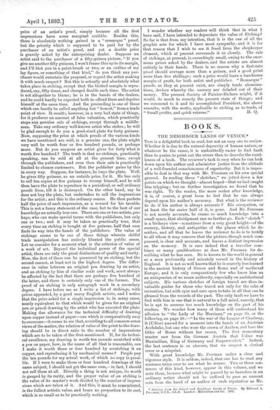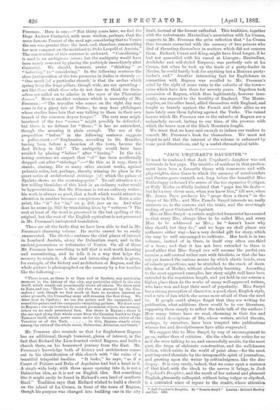BOOKS.
THE NEIGHBOUR LANDS OF VENICE.* This is a delightful book to read, but not an easy one to review. Whether it is due to the natural depravity of human nature, or whatever be the cause, it is undoubtedly easier to find fault than to praise, to point out the errors than to describe the excel- lences of a book. The reviewer's task is easy when he can look down upon his author and administer justice from the altitude of a well-founded consciousness of superiority. But it is impos- sible to deal in that way with Mr. Freeman on Ms own special ground. In reading these "sketches," we jotted down a few points on which we thought—almost hoped—that we had caught him tripping ; but on further investigation we found that he was right. To the reader, the mere seeker after knowledge, it is, of course, a great boon to feel that he can always depend upon his author's accuracy. But what is the reviewer to do if his author is always accurate ? His occupation, or at least the far easier half of it, is gone. And Mr. Freeman is not merely accurate, he crams so much knowledge into a small space, that abridgment can no farther go. Each" sketch" is a birdseye view—a.metimes from a very great height—of the scenery, history, and antiquities of the places which he de- scribes, and all that he leaves the reviewer to do is to testify to all whom it may concern that the picture, though much com- pressed, is clear and accurate, and leaves a distinct impression on the memory. It is rare indeed that a traveller com- bines so many qualifications as does Mr. Freeman for de- scribing what he has seen. He is known to the world in general as a man profoundly and minutely versed in the history of England. It is not so well known that he is scarcely less learned in the ancient history of Greece and Rome and of medimval Europe ; and it is only comparatively few who know him as an antiquarian of no mean authority, especially on architectural subjects. His various sketches of foreign travel are thus in- valuable guides for those who travel not only for the sake of recreation, but with eyes and ears open to take in all that can be gleaned from the records of the past. The only fault we have to find with him is one that is natural to a full mind, namely, that he is apt to assume too much knowledge on the part of his readers. We wonder how many of them will understand his allusion to "the Lady of the Mercians," on page 30, or the following, on page 28:—" In the war of the League of Cambray, it (Udine) passed for a moment into the hands of an Austrian Archduke, but one who wore the crown of Aachen, and bore the titles of Rome without her crown. The first momentary master saw from the German Austria that Udine was Maximilian, King of Germany and Emperor-elect." Indeed, the last sentence is so obscure, that we suspect a clerical error or a misprint. With great knowledge Mr. Freeman unites a clear and vigorous style. It is seldom, indeed, that one has to read any sentence twice over to see what he means. Two or three sen- tences of this kind, however, appear in this volume, and we note them, because what might be passed by as harmless in an ordinary writer should not be suffered to pass as current coin from the hand of an author of such reputation as Mr.
• Sketches from ihs Sub j•ct and Neighbour Lands of Venice. By Edward A.. FreLman, D.C.L., LL.D. London Macmillan and Co. 1881.
Freeman. Here is one :—" Not thirty years later, we find the Doge Andrew Contarini, with more wisdom, perhaps, than the more famous Foscari of the next age, considering that to Venice the sea was greater than the land, and, therefore, commending her new conquest on the mainland to Duke Leopold of Austria." The construction of this sentence is awkward. "Considering," is used in an ambiguous sense ; but the ambiguity would have been nearly removed by placing the participle immediately after Contarini. We should, however, prefer " thinking " or believing," to "considering." In the following sentence the
close juxtaposition of the two pronouns in italics is slovenly :— "One merit [of a particular church] is that the arches which spring from the huge pillars, though wide, are not sprawling — not like those which those who do not dare to think for them-
selves are called on to admire in the nave of the Florentine duly/no." Here is another sentence which is unworthy of Mr.
Freeman :—" The traveller who comes on the right day may come in for a gipsy fair at Duino ; he may hear philologers whose studies have lain that way talking to them in their own branch of the common Aryan tongue." The very near neigh- bourhood of the two " comes " might possibly be defended ; but there is no defence for " them ; " it has no antecedent, though the meaning is plain enough. The use of the preposition " before " in the following sentence suggests a police-court :—" Euplirasius, according to Dr. Kandler, having been before a decurion of the town, became the first Bishop in 524." The ambiguity would have been avoided by placing " before " after "having." In the fol- lowing sentence we suspect that " of " has been accidentally dropped out after "strivings " :—" Be this as it may, there it stands, sinning, like so many other ancient works, against pedantic rules, but, perhaps, thereby winning its place in the great series of architectural strivings [of] which the palace of Spalato shows us the crowning-point." To call attention to a few trifling blemishes of this kind in an ordinary writer would be hypercriticism. But Mr. Freeman is not an ordinary writer ; his work is always so good, that a fault which would attract no attention in another becomes conspicuous in him. Even a mis- print, like " it " for "in," on p. 269, jars on us. And what
does he mean (p. 362) by translating BiZEOI by " writeous "? The root at least of the word is preserved in the bad spelling of the original, but the root of the English equivalent is not preserved in Mr. Freeman's caricatured translation.
These are all the faults that we have been able to find in Mr.
Freeman's charming volume. Its merits cannot be so easily enumerated. The Sketches embrace the chief places of interest in Lombard Austria, along the Dalmatian coast, and in the
ancient,pcissessions or tributaries of Venice. On all of these Mr. Freeman has something to tell that is well worth knowing and remembering, and he tells it in a way that helps the memory to retain it. A clear and interesting sketch is given, for example, of the history and architecture of Ragusa, and the whole picture is photographed on the memory by a few touches like the following :—
"There is not, as there is at Zara and at Spalato, any particular moment in the history of the city, any particular object in the city itself, which stands out prominently above all others. We draw near to Zara and say, 'There is the city that was stormed by the Cru- saders ;' and, though we find much at Zara to awaken interest on other grounds, the Crusading siege still remains the first thing. We draw near to Spalato ; we see the palace and the campanile, and round the palace and the campanile everything gathers. We draw near to Ragusa; the eye is struck by no such prominent object; the memory seizes on no such prominent fact. But there is Ragusa ; there is the one spot along that whole coast from the Croatian border to Cape Tainaros itself, which never came under the dominion either of the Venetian or of the Turk In this, Ragusa stands alone among the cities of the whole coast, Dalmatian, Albanian, and Greek."
Mr. Freeman also reminds us that for Englishmen Ragusa has an additional, though transient, gleam of interest, in the fact that Richard the Lion-hearted visited Ragusa, and built a church there, on his homeward journey from the East. Mr. Freeman's knowledge both of history and architecture comes out in his identification of this church with "the ruins of a beautiful triapsidal basilica. "It looks," he says, "as if a Count of Poitiers and Duke of Aquitaine had had a hand in it.
A single wide body, with three apses opening into it, is not a Dalmatian idea, as it is not an English idea. But something like it might easily be found in Richard's own land of southern Gaul." Tradition says that Richard wished to build a church on the island of La Croma, in front of the town of Ragusa, though his purpose was changed into building one in the city
itself, instead of the former cathedral. This tradition, together with the unfortunate Maximilian's association with La Croma, suggests to Mr. Freeman the grim reflection that "La Croma thus becomes connected with the memory of two princes who died of thrusting themselves in matters which did not concern them. Richard, Count and King, might have lived longer, if he had not quarrelled with his vassal at Limoges ; Archduke and self-styled Emperor, was perfectly safe at La Croma, but when he took up the trade of a party-leader in Mexico, he could hardly look for anything but a Mexican party- leader's end." Another interesting fact for Englishmen in connection with Ragusa was recalled to Mr. Freeman's mind by the sight of some ruins in the suburbs of the town— ruins which have lain there for seventy years. Napoleon took possession of Ragusa, which thus legitimately, however inno- cently, was exposed to the hostility of England. The Monte- negrins, on the other hand, allied themselves with England, and fought as bravely against the French and their allies as we have lately seen them fighting against the Turks. The ruined houses which Mr. Freeman saw in the suburbs of Ragusa are a melancholy record, lasting to our time, of the prowess with which the brave men of the Black Mountain fought.
We trust that we have said enough to induce our readers to consult Mr. Freeman's book for themselves. We must not forget to add that the interest of the volume is enhanced. by some good illustrations, and by a useful chronological table.















































 Previous page
Previous page